July brought rains and a welcome breeze, but also a wave of contradictions for Indian businesses. While the monsoon revived the country’s landscape, the corporate and startup sectors faced a storm of their own.
Well, the economy showed signs of stress — with huge layoffs in the IT sector and continuing geopolitical tensions, but the startup ecosystem’s mood was lifted by the listings of coworking giants Smartworks and IndiQube, even as many other unicorns filed their DRHPs, including ecommerce and retail giant Lenskart.
But moving on to the early stage innovators, we are witnessing some disruptive forces that are rewriting the rules of scale, growth and distribution. And so we return with the 61st edition of the 30 Startups To Watch series — Inc42’s monthly roundup of the most-promising early stage ventures.
In this month’s curation, we have endeavoured to capture startups disrupting sectors like AI, defence tech, cleantech, D2C, fintech, and fashion quick commerce.
Let’s dive into the 30 startups that caught our eyes in July.
Editor’s Note | The list below is not a ranking of any kind. We have listed the startups alphabetically.
8OL Robotics | Rethinking Drone Warfare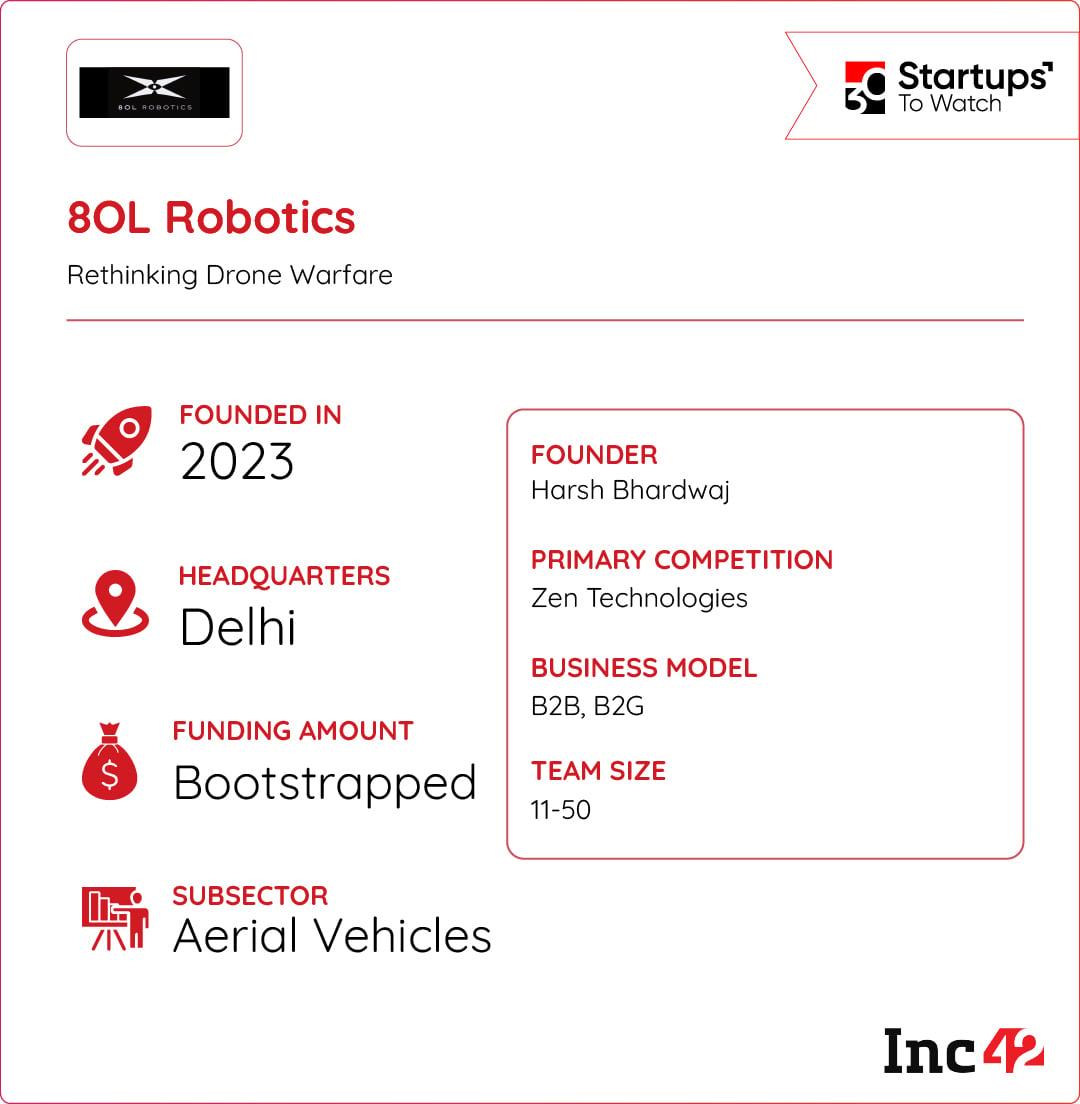
India’s growing defence needs, driven by rising geopolitical tensions, have created an urgent push for indigenous innovation in the defence sector, projected to reach $37.6 Bn by 2030, growing at about 4.2% annually.
While the country has long relied on imports, a new generation of homegrown startups is now stepping up with advanced technology to reduce this dependence.
Among them is 8OL Robotics, a deeptech startup founded in 2023 by IIIT alumnus Harsh Bhardwaj. The company is developing military-grade flight controllers and IoT-based solutions to enhance the performance and intelligence of defence drones.
Incubated at IIT Delhi and supported by the IIITD Innovation & Incubation Centre and automotive giant Motherson, 8OL Robotics has built a range of precision products. These include Setty, a multi-sensor flight controller; NavIC GNSS, a high-accuracy satellite navigation system; and rugged flight controllers built to defence-grade specifications with integrated compass and analogue sensors.
These components enable critical features such as swarm intelligence for coordinated drone attacks, precision targeting, and secure data transmission.
Belong | Simplifying Cross-Border Savings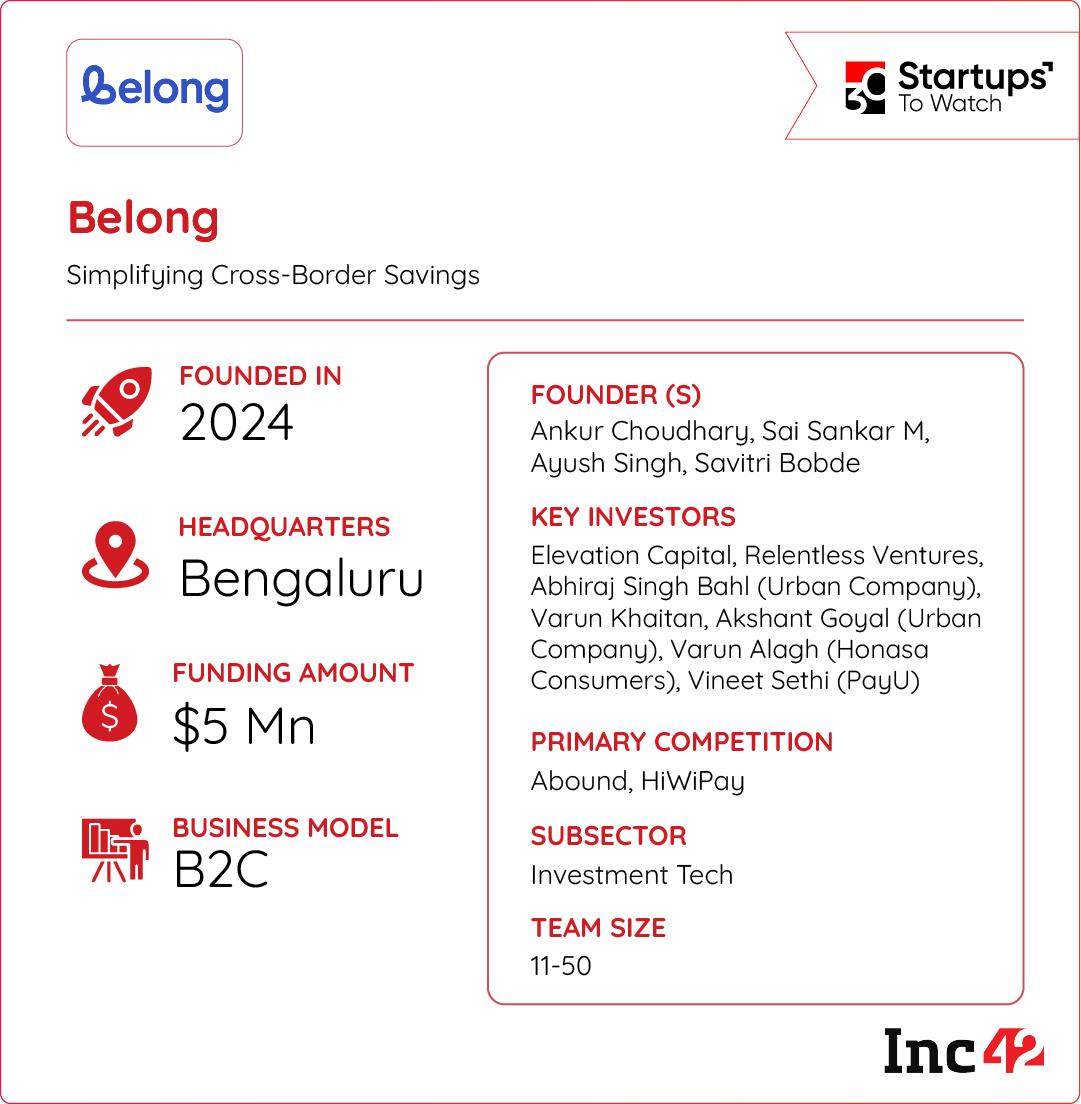
For many non-resident Indians (NRIs), navigating cross-border finances can be a complex and frustrating experience. Regulatory hurdles, currency risks and unclear tax laws often make it difficult to invest across geographies.
To address these challenges, Ankur Choudhary, Ayush Singh, Sai Sankar M and Savitri Bobde launched Belong in 2024 — a fintech platform built to help NRIs better manage their wealth from abroad.
The app’s first offering is a high-interest fixed deposit product for NRIs in the UAE, allowing users to save their US dollar earnings in Indian FDs without needing an NRE or NRO account.
The deposits are tax-free, offer attractive returns, and can be withdrawn directly to UAE-based accounts. This also helps users hedge against Indian Rupee depreciation.
Belong also provides smart tools to compare FD rates across Indian banks, determine tax residency status, understand local financial regulations, and monitor the Indian stock markets.
The platform plans to expand its offerings to include mutual funds, stocks, credit cards, and even foreign currency savings accounts in the Indian fintech market, projected to breach the $990 Bn mark by 2032, growing at a CAGR of 30.2%.
Better Nutriti on | Solving India’s Nutrient Gap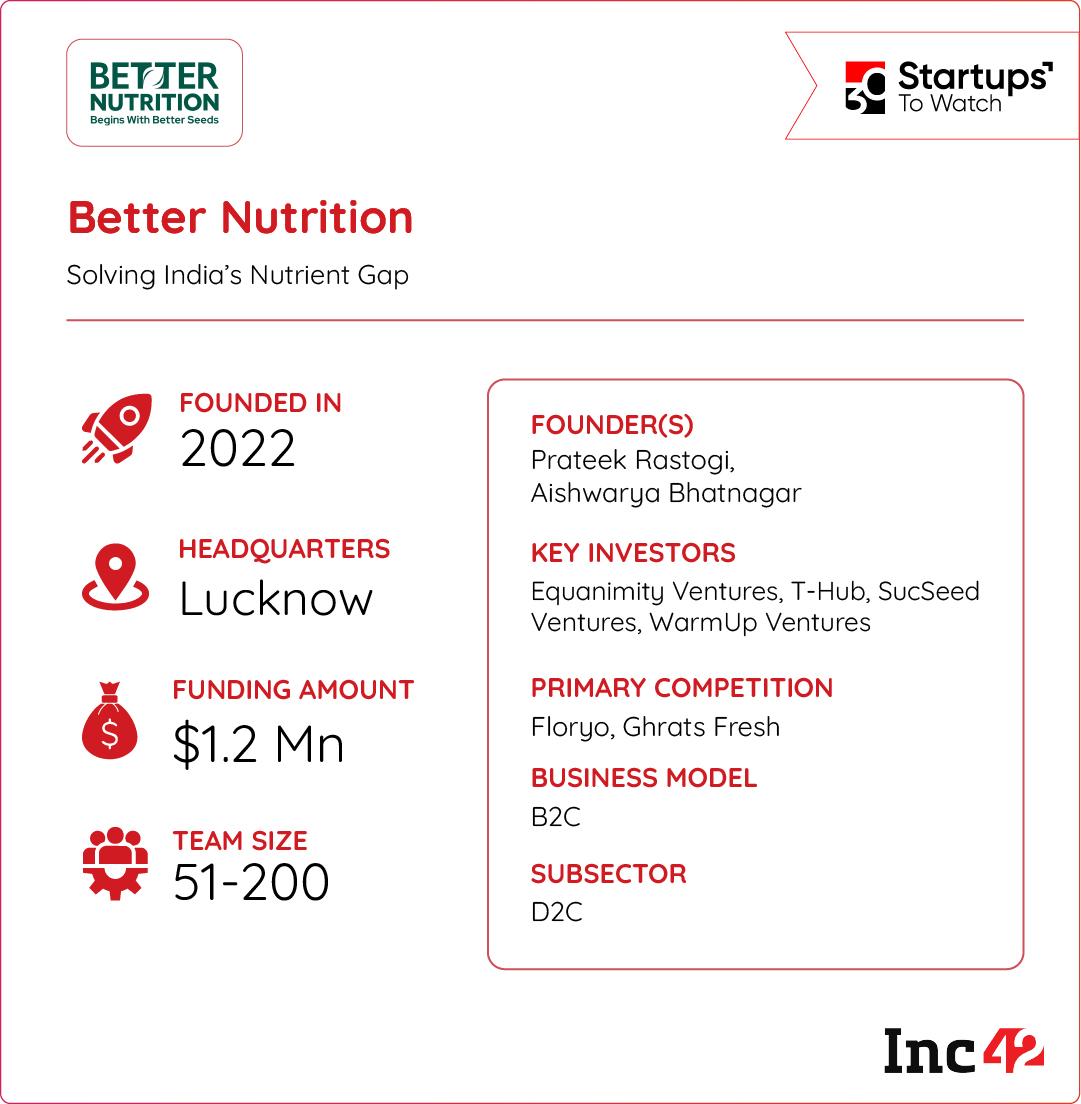
Despite India’s growing urban obesity problem, a lesser-known crisis is hiding in plain sight — a serious nutrient gap in the average Indian diet.
Studies show that most Indians consume only 70% or less of their daily nutrient requirements, which can lead to serious health issues over time. But the problem isn’t just lack of awareness — it’s cultural, as only a few are willing to give up the foods they’ve grown up with, even if those staples may be silently contributing to poor health.
That’s the gap Better Nutrition aims to close. Founded in 2023 by IIM Ahmedabad alum Prateek Rastogi and former ICICI Securities executive Aishwarya Bhatnagar, the D2C brand offers everyday staples like flour, grains and rice that are naturally rich in key nutrients such as zinc, iron, protein, fibre, and calcium.
Better Nutrition works directly with over 15,000 farmers who grow crops sustainably and without harmful chemicals. The startup also enables local sellers to distribute its products. In doing so, it’s not only helping Indians eat healthier, but also empowering farming communities.
Despite being a D2C brand, it operates in the larger Indian agritech space, expected to become an$580.82 Bn market opportunity by 2028. It directly locks horns with legacy players like Aashirwaad, Pilsbury, among others.
BIVA | Helping Consumer Brands Ditch Spreadsheets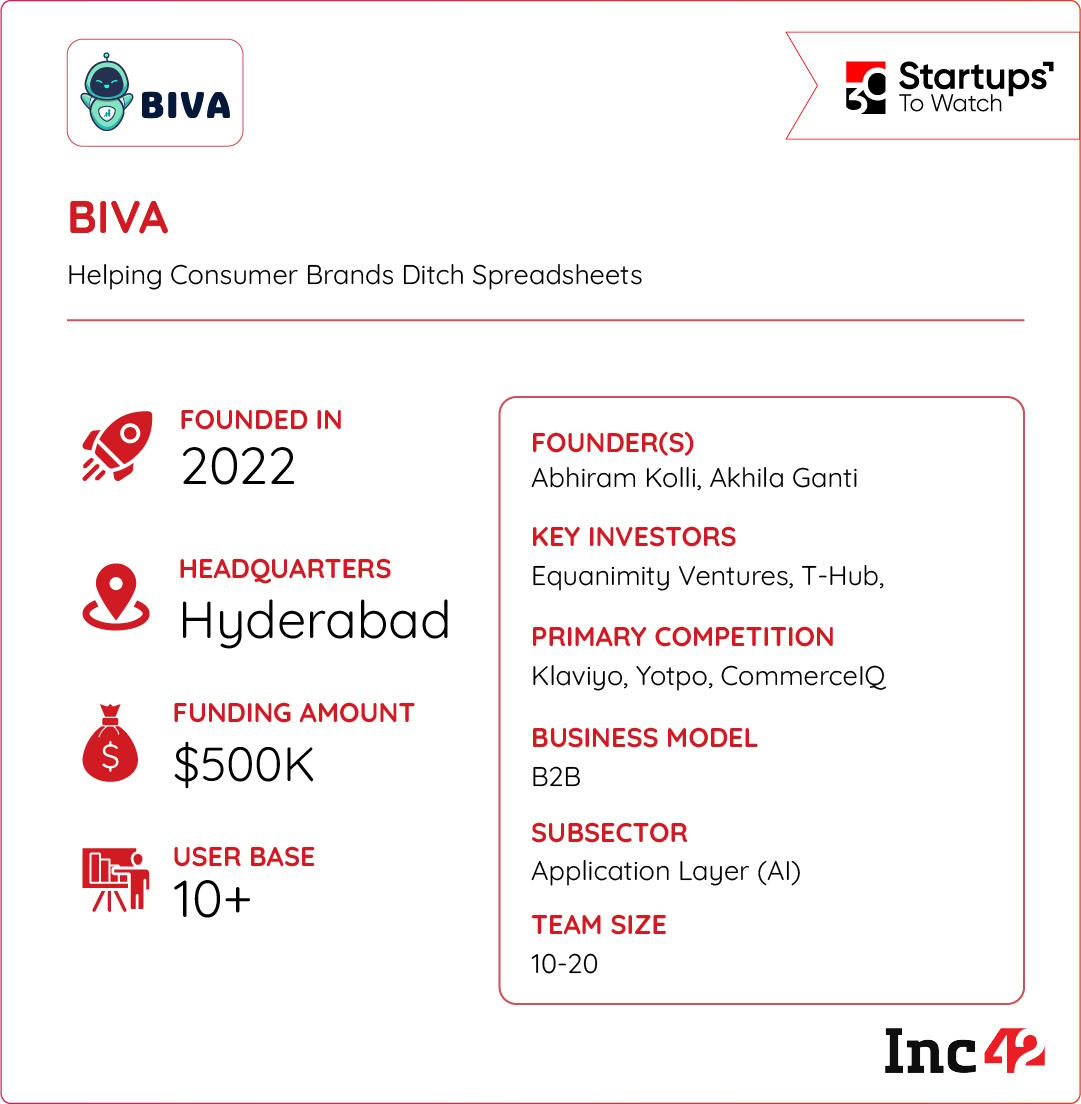
Despite a surge in tech adoption, many Indian businesses face operational inefficiencies due to scattered data and disconnected systems.
Business-critical information is often spread across various tools and platforms, making it difficult to get a real-time view of how the company is actually performing.
Addressing this problem is BIVA, a SaaS startup founded in 2022 by Abhiram Kolli and Akhila Ganti — both formerly with a data management firm, Saras Analytics.
BIVA positions itself as a “personal business assistant” for fast-growing ecommerce and D2C brands. Its platform unifies all key business metrics — from marketing and sales to logistics and inventory — into one dashboard, eliminating the need to juggle spreadsheets or switch between multiple tools.
The product integrates seamlessly into existing systems in under five minutes and delivers real-time reports that are easy to access and understand.
Chai Shots | Riding On The Bite-Sized Drama WaveThe platform also enables smarter decision-making by letting users organise data by business function, frequency of use, or urgency of action. Its clientele includes the likes of Clensta, Elevar, GOAT Brand Labs, and BIVA.
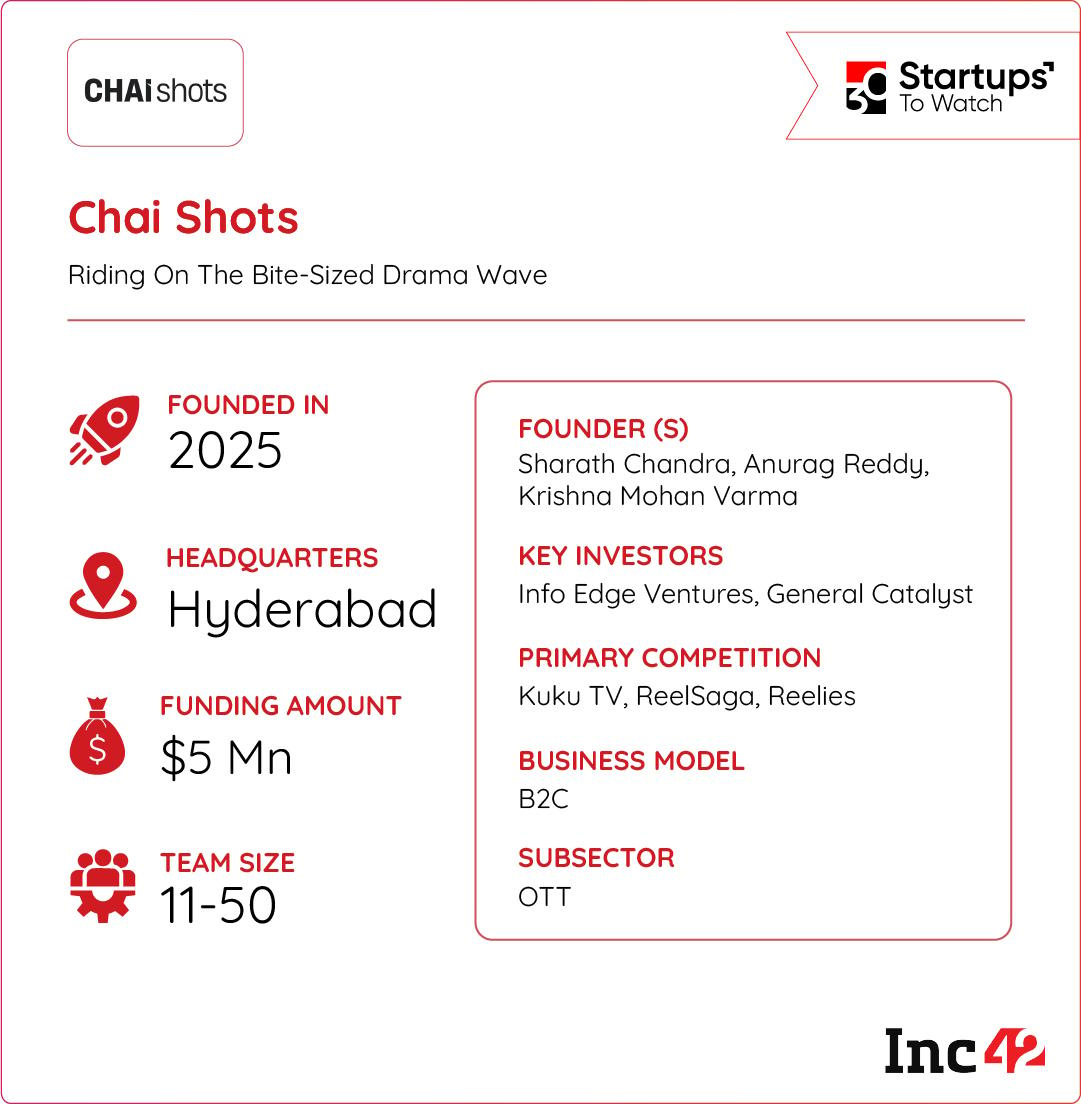
Short-form dramas are quickly becoming the next frontier in India’s OTT content space. But while global platforms experiment with bite-sized storytelling, much of the content still feels disconnected from regional realities.
Chai Shots, launched in 2024 by Telangana-based digital media company Chai Biskets founders Anurag Reddy, Sharath Chandra, and Krishna Mohan Varma, aims to change that by creating microdramas rooted in Indian culture and language.
Built for mobile-first viewing, the Chai Shots app features two-minute drama videos designed to be watched vertically — perfect for people who want cinematic stories in snackable form.
Unlike many platforms that rely on dubbed content, Chai Shots focusses on original, hyperlocal storytelling that resonates with regional audiences. The app has plans to expand in Hindi, Tamil, Malayalam, and Kannada. Backed by $5 Mn in funding, the platform is on track to release more than 100 original shows.
With the global microdrama market expected to nearly double to $12 Bn by 2030, Chai Shots is positioning itself as a homegrown disruptor in India’s vertical storytelling space.
Cliqq AI | Bridging The Human-AI Divide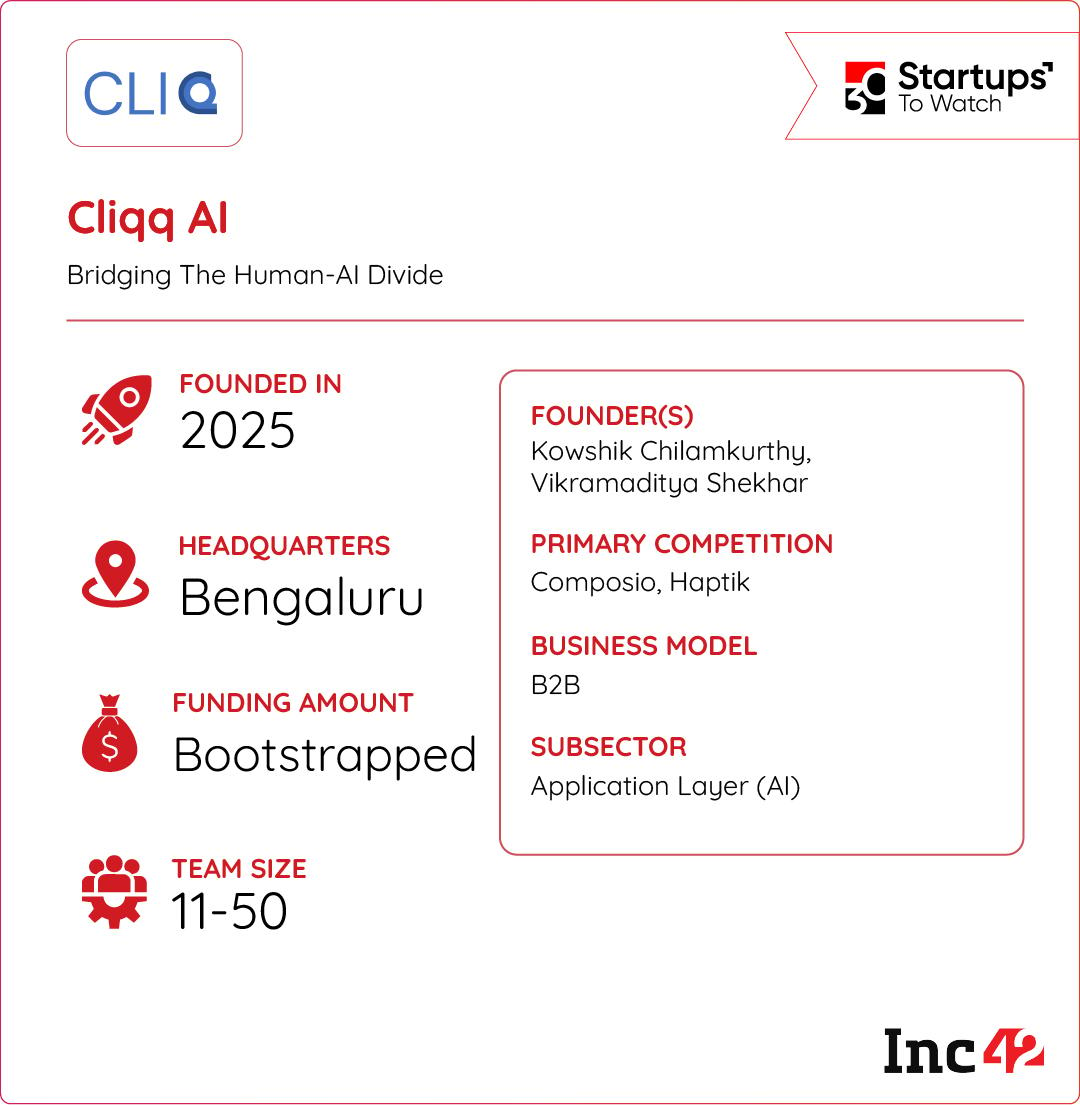
For many businesses, integrating AI into daily workflows still feels complex, especially when it comes to making these systems feel intuitive and human. Addressing this gap is Cliqq AI, a startup launched in 2024 by Vikram Shekhar and Kowshik Chilamkurthy.
Cliqq AI focusses on building voice-first AI platforms that enable people to interact with digital systems by simply speaking. Whether it’s a website, app, or internal business tool, Cliqq’s technology allows users to navigate and engage using conversational voice commands.
For customer support, its intelligent assistants can understand voice, text and even images to provide faster, more accurate responses. In sales, its AI agents help automate repetitive tasks, freeing up teams to focus on building relationships and closing deals.
Clixi | “ Pahaadon Wali Taxi”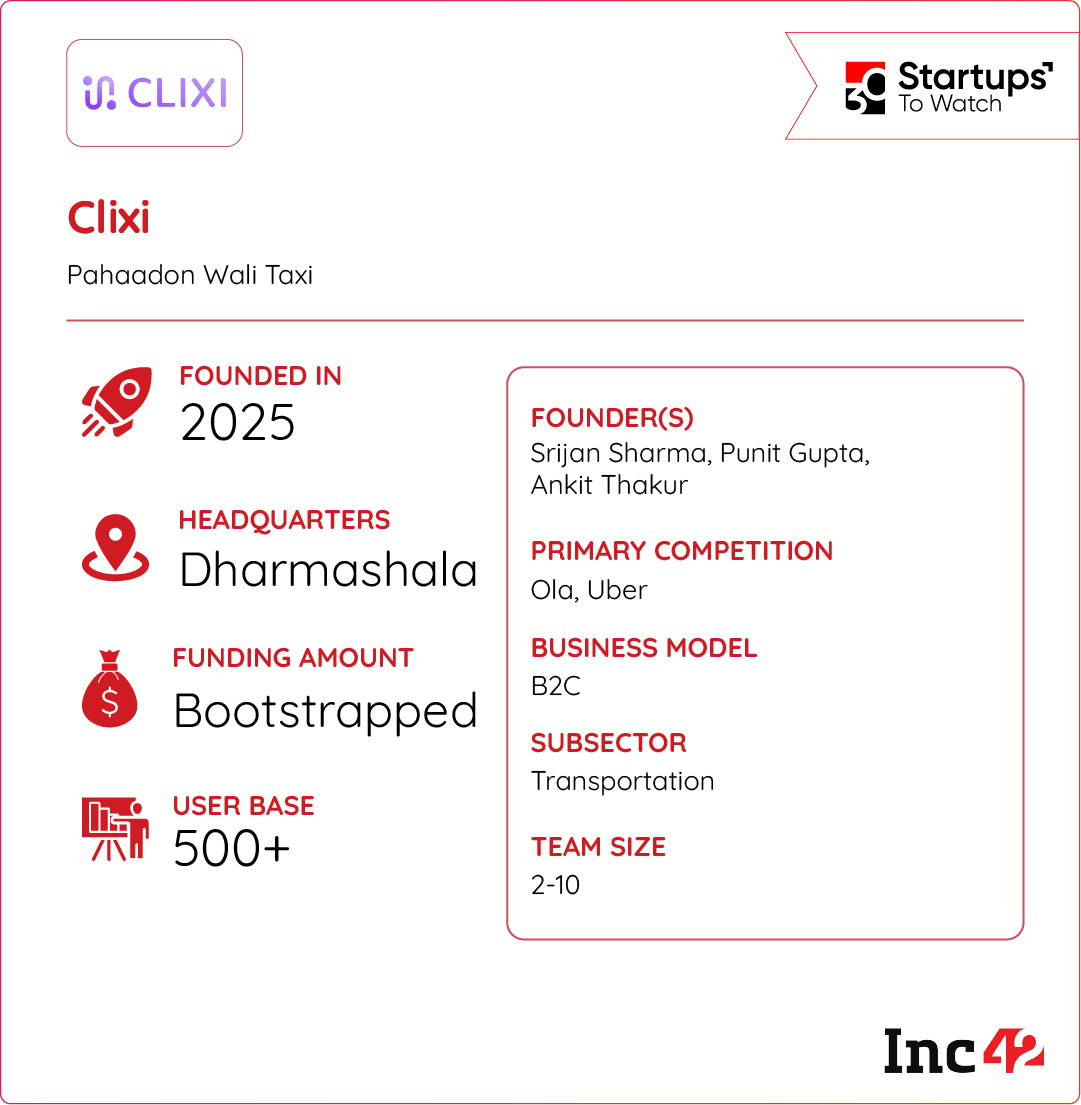
Travelling to India’s remote or mountainous regions often comes with one major challenge — finding reliable, affordable transport. Despite a rise in ride-hailing services in urban areas, hilly regions like Himachal Pradesh remain largely underserved.
To address this gap, ItsHemp founder Srijan Sharma and angel investor Punit Gupta launched Clixi in 2024 — a ride-hailing startup calling itself “Pahaadon Wali Taxi” or the taxi service for Himalayan towns in India.
Clixi aims to build a sustainable, local-first alternative for hill transport, starting with Himachal. Its app-based platform offers a variety of vehicles, from six-seater SUVs to bike taxis, designed to meet the region’s varied terrain and commuter needs. Unique to Clixi is its driver-first model (where drivers keep 100% of their earnings) and a customer-driven fare system that ensures affordability and transparency.
Since launch, Clixi has already onboarded over 100 drivers. The startup also plans to introduce courier services in the near future. While it may eventually face competition from national players like Ola and Uber, Clixi’s hyperlocal approach and community-first ethos could give it a strong foothold in the hills.
Contrails AI | Taking On India’s Deepfake Crisis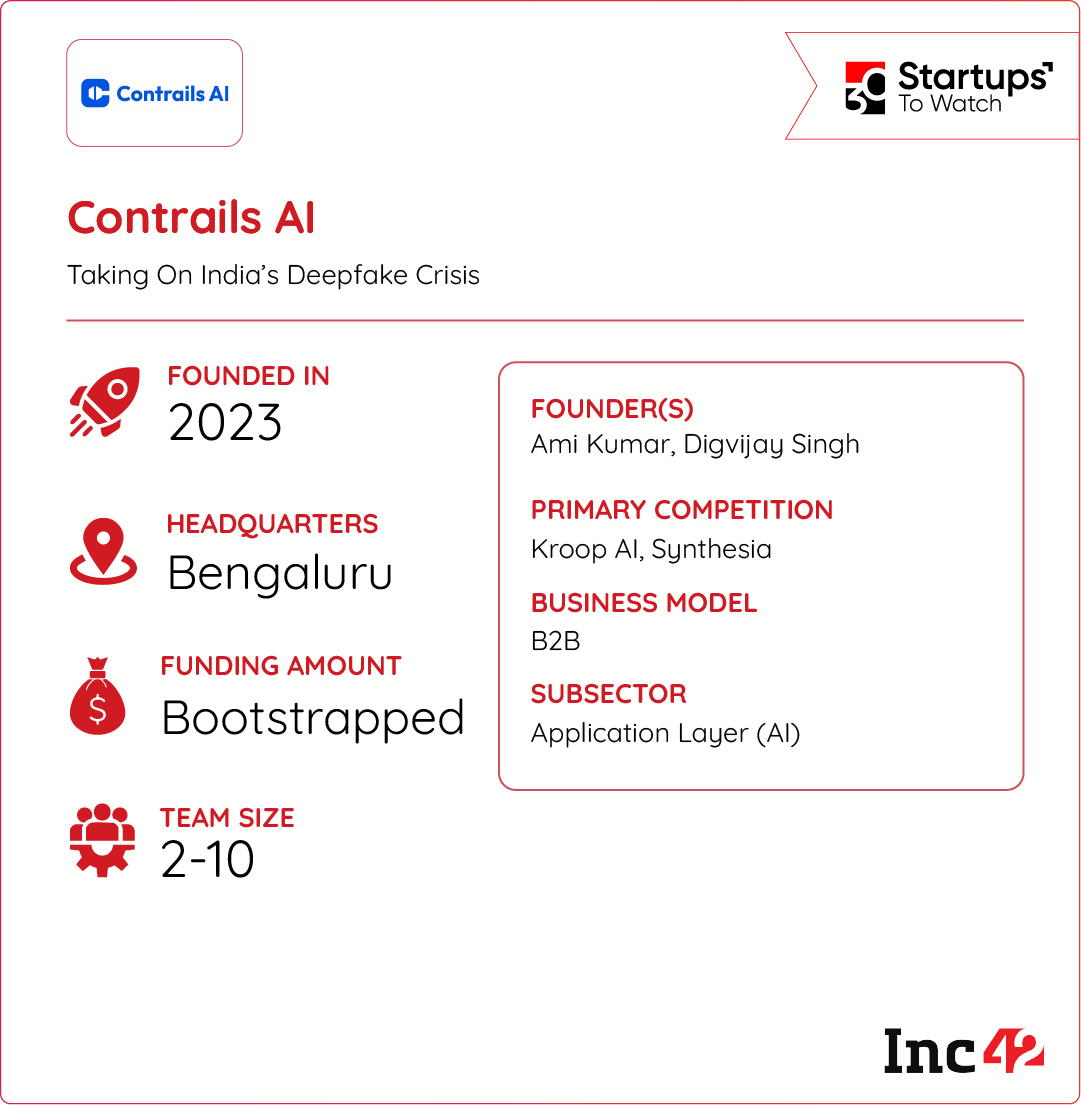
India’s rapid digital growth has come with an unsettling side effect — the rising threat of deepfakes.
With widespread internet access and the boom in social media usage, manipulated digital content is becoming harder to detect and more dangerous.
Deepfakes are increasingly being used for financial fraud, cyber harassment, and we have barely scratched the surface here. Despite the growing threat, India currently lacks dedicated legislation to tackle this growing mess.
To address this growing crisis, Ami Kumar and Digvijay Singh launched Contrails AI in 2023. It acts as a digital watchdog, helping platforms maintain safer environments in an age of increasingly deceptive content.
The startup builds advanced AI-powered tools that help detect and remove deepfakes, misinformation, hate speech, and illegal advertisements from digital platforms.
Its technology is capable of analysing various forms of digital media — from images and videos to audio — and flagging harmful or manipulated content with speed and accuracy.
Coratia Technologies | Powering India’s Underwater Missions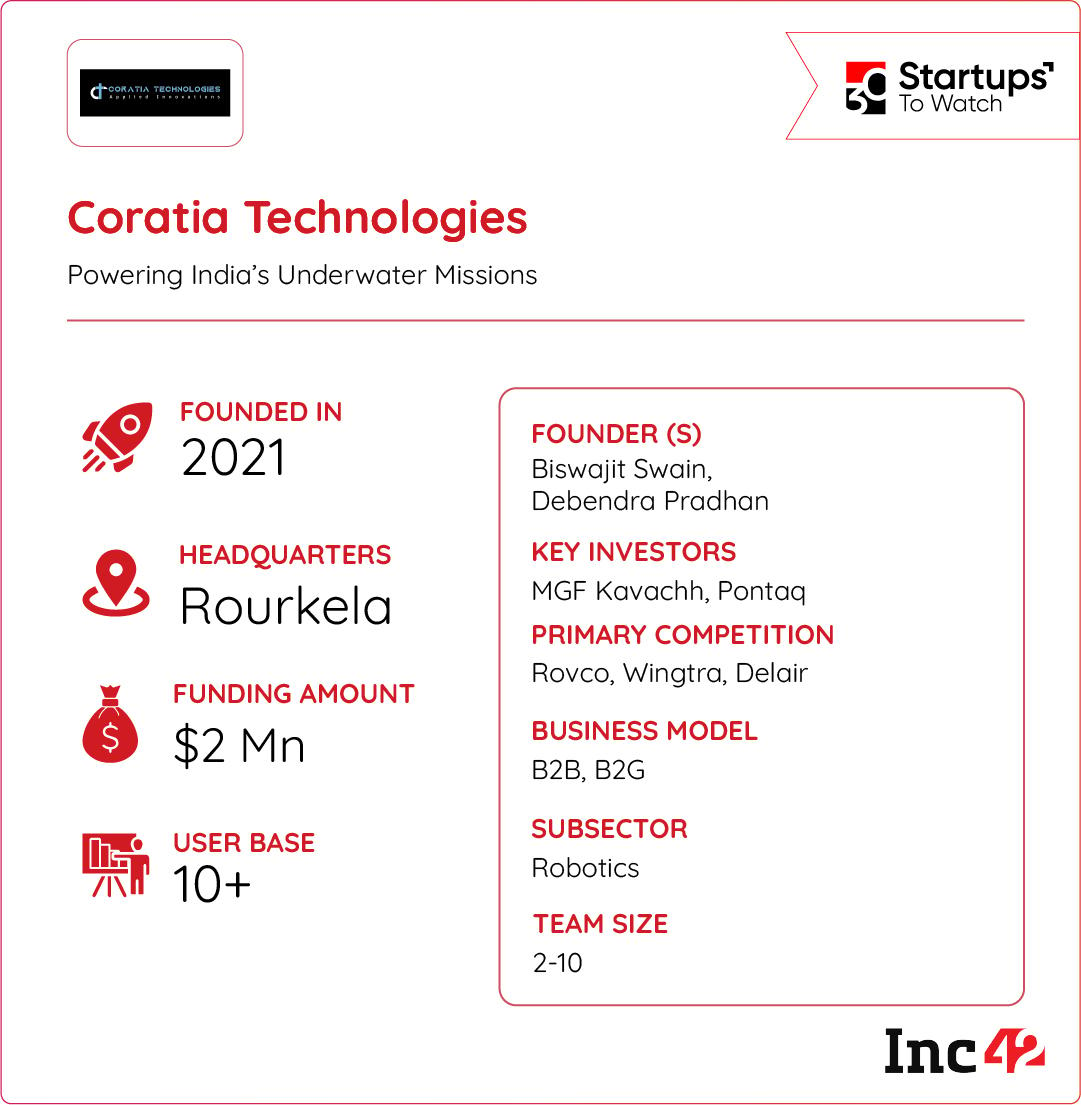
Founded in 2021 by NIT Rourkela alumni Biswajit Swain and Debendra Pradha, Coratia Technologies is building India’s underwater intelligence layer, using high-tech robotics to solve complex challenges beneath the surface.
The startup designs and manufactures remotely operated vehicles (ROVs) and autonomous underwater vehicles (AUVs) that are built for diverse underwater missions.
These robotic systems are capable of inspecting submerged infrastructure, such as ship hulls, bridges, pipelines and dams, and supporting critical sectors like oil & gas, maritime logistics and civil infrastructure.
Coratia’s solutions also aid environmental research, underwater mapping, and search and rescue operations in hard-to-reach or hazardous zones.
The startup counts Tata Steel, SAIL, Indian Oil, and Indian Railways among its clients.
Coratia recently secured a contract with the Indian Navy to deploy its indigenously developed ROVs for underwater surveillance and security.
Curie Money | A Smarter UPI App That Helps You Save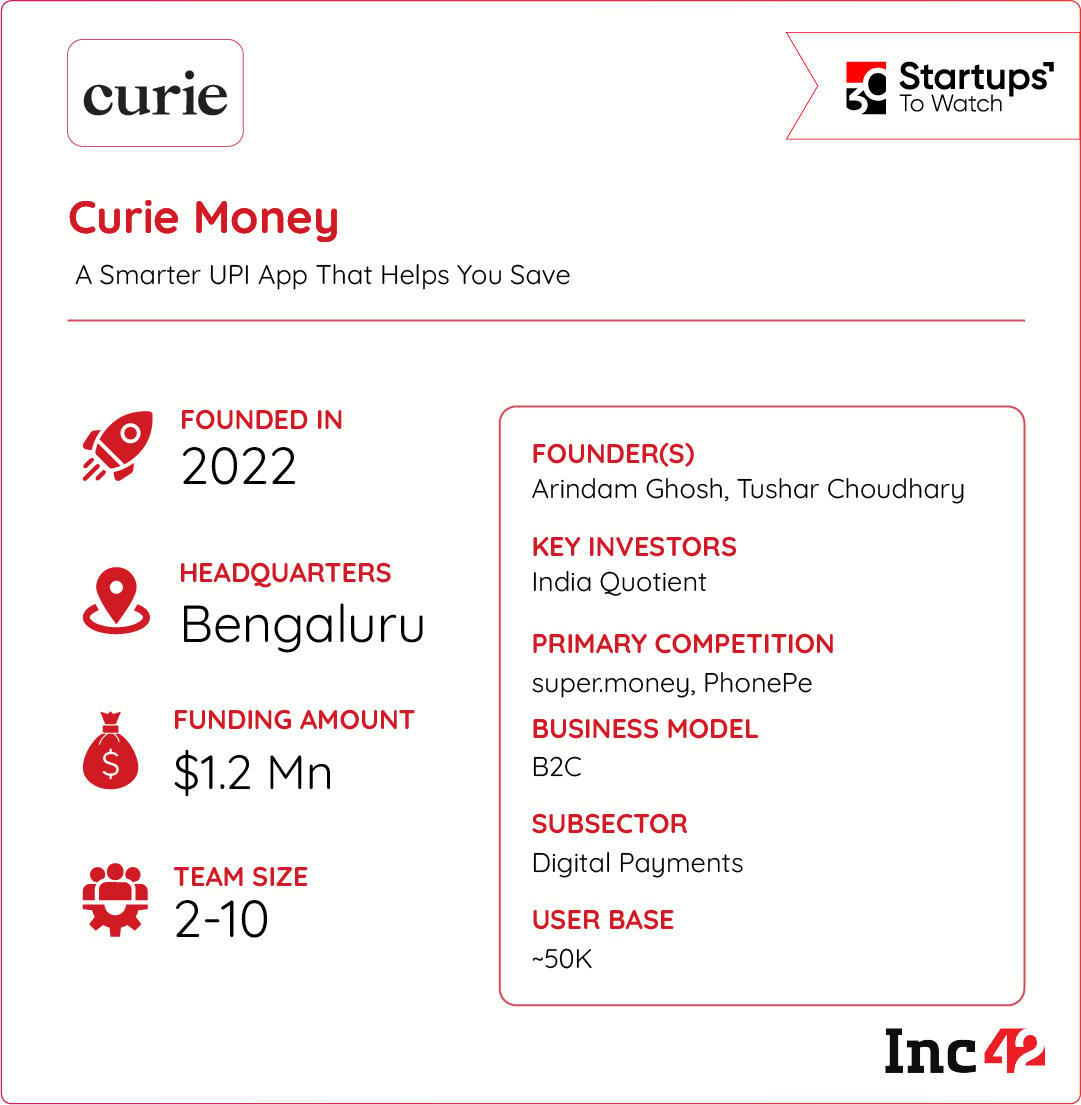
While UPI has made payments seamless, it’s also made it easier to spend without thinking. Curie Money wants to change that by combining everyday spending with smart investing.
Launched as a UPI-based fintech platform, Curie Money helps users grow their savings while continuing to use UPI as they normally would. Instead of letting your money sit idle in a low-interest savings account, Curie invests it into liquid mutual funds, which are financial instruments that typically offer higher returns while still allowing instant access.
Whenever one needs to make a UPI payment, the app automatically deducts the amount from the invested funds and completes the transaction. This way, the money remains invested, without affecting daily convenience.
Dear Diary: Offering Perfume With Personality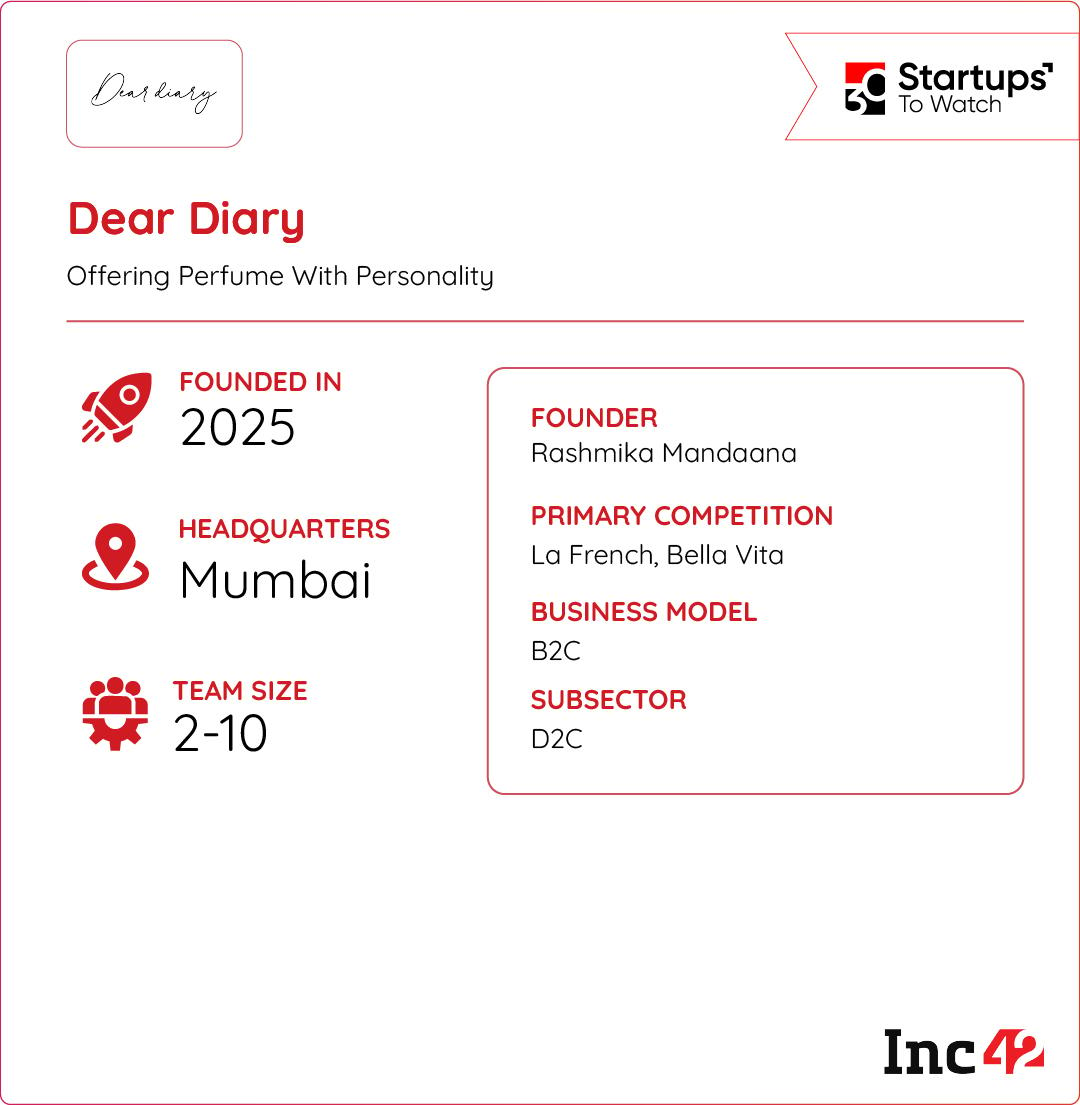
In India’s fast-growing fragrance market, people are no longer just buying perfumes. Today’s consumers are looking for products that reflect their personality, evoke emotions, and tell meaningful stories. They want fragrances that feel personal and unique.
That’s the gap Dear Diary aims to fill. Cofounded by popular actress Rashmika Mandanna, the D2C fragrance brand offers a line of perfumes inspired by her own journey and experiences.
Each scent is designed to capture a specific emotion. The idea is simple — make fragrance more personal, expressive, and relatable.
Mandanna has launched her brand at a time when the Indian perfume market is thriving. Valued at around $612.98 Mn in 2024, it is expected to double to $1.24 Bn by 2029, growing at a CAGR of over 15%. Rising interest in self-care, growing disposable incomes, and the influence of celebrities and social media trends are fuelling this growth.
In this blooming landscape, Dear Diary, being a fresh entrant, has its hands filled with startups like La French and Bella Vita along with more premium brands like Yardley.
Emergent | Building Full-Stack Apps With AI-First DevelopmentThe startup’s perfumes’ pricing, ranging between INR 1,500 to INR 2,500, puts it at a slightly premium side of the segment.
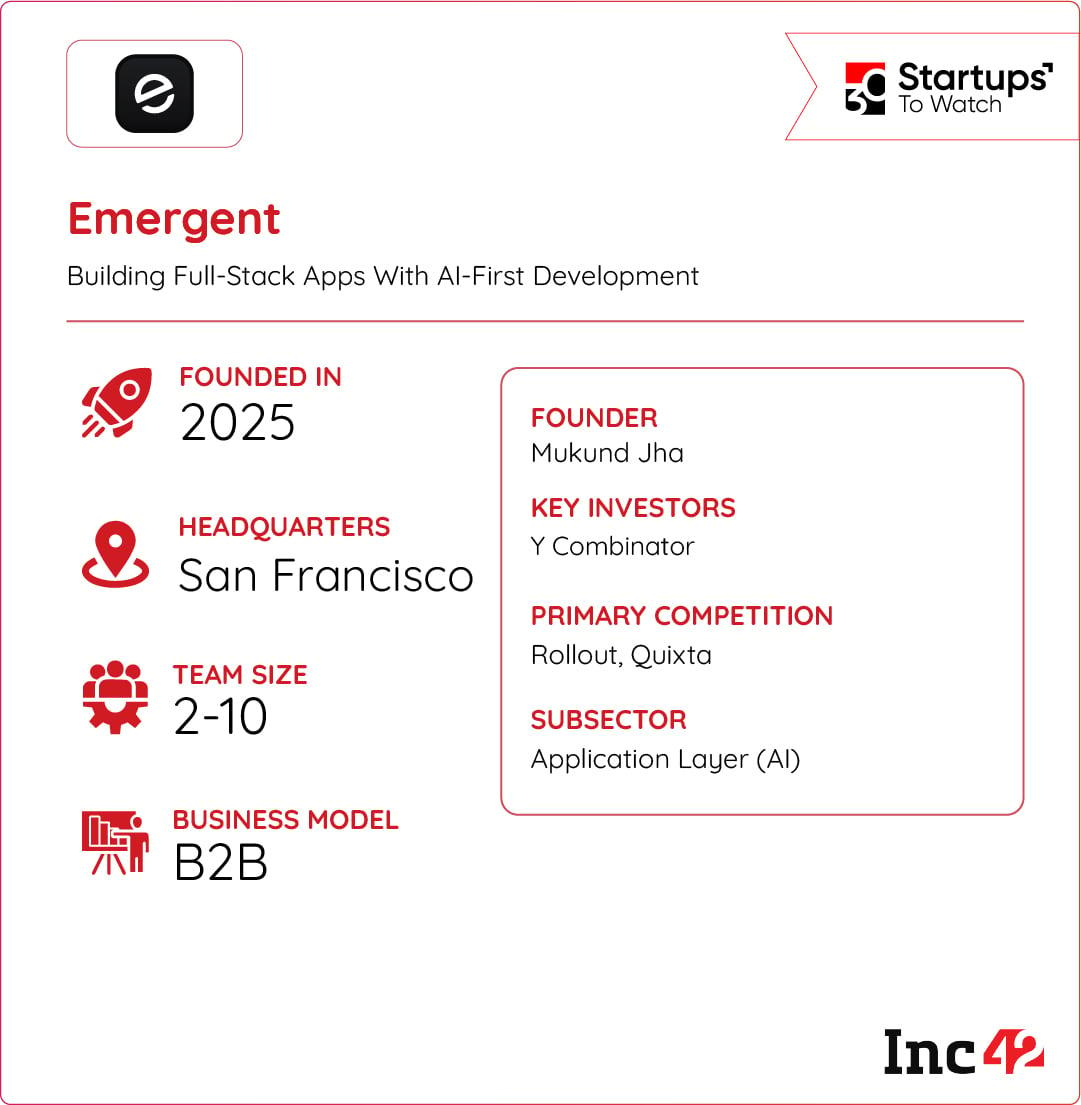
Despite the rise of generative AI tools, building scalable software still demands significant time and engineering bandwidth. Most tools today are limited to generating code snippets or wireframes and rarely go beyond the prototyping phase.
Emergent bridges this gap by building and deploying real-world applications from scratch using just natural language prompts.
Founded in 2024 by Dunzo’s former cofounder and CTO Mukund Jha, Emergent enables developers and teams to create production-ready applications — complete with backend logic, data models, APIs, and UIs — using autonomous AI agents.
Unlike low-code platforms that require heavy configuration, Emergent interprets business logic from text and converts it into functioning codebases tailored to the user’s needs.
The platform is also capable of automating code migrations across tech stacks, helping legacy businesses modernise their systems without large dev teams. Jha envisions Emergent as a new kind of interface between humans and software, where apps are built collaboratively with AI.
Escape Plan | Building A Vertical Ecosystem For Modern Travellers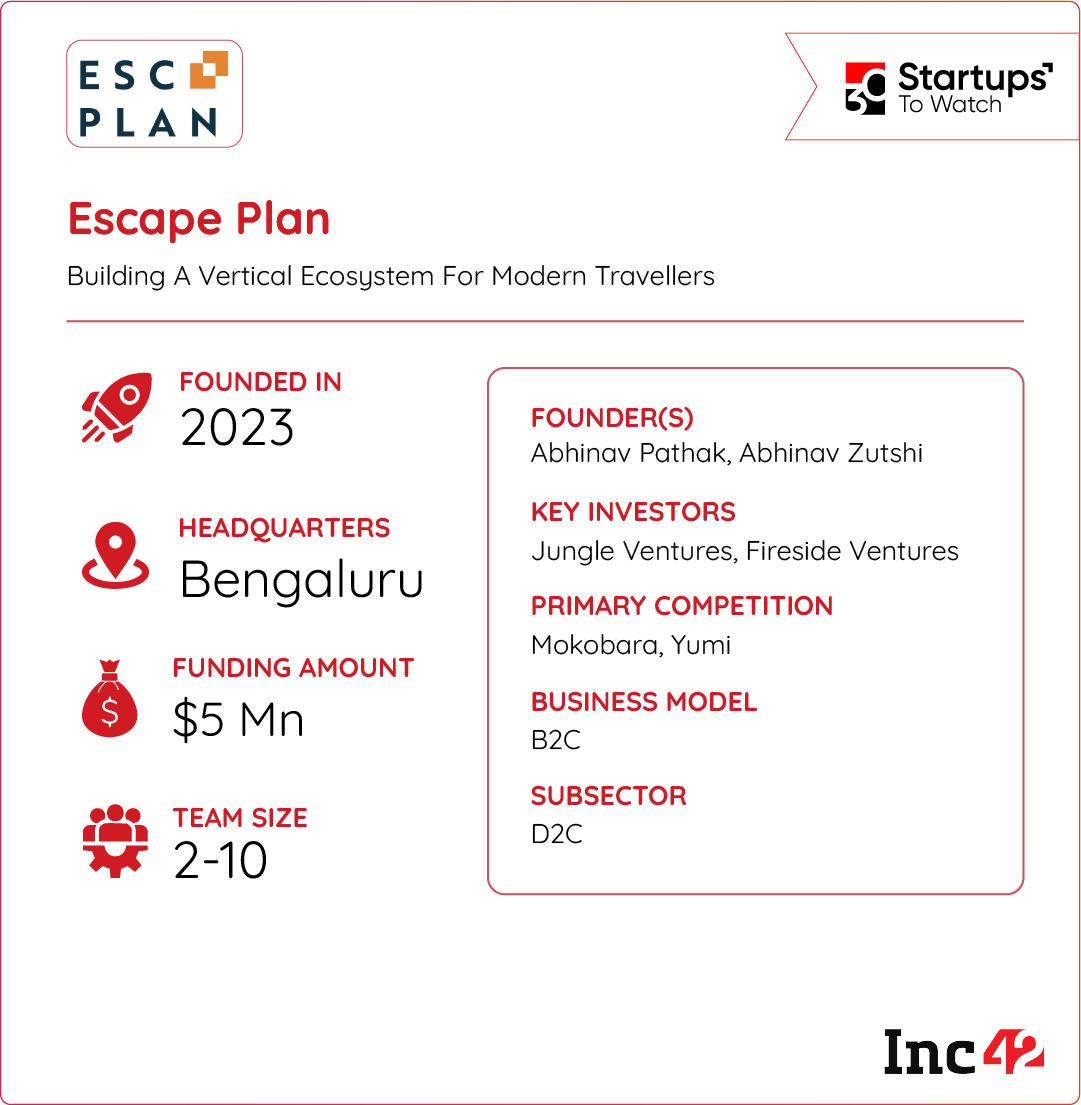
Founded in 2025 by Abhinav Pathak (ex-founder of Perpule) and Abhinav Zutshi (former COO of Landmark Group), Escape Planis a travel accessories startup looking to redefine the way Indians pack and travel.
The brand offers a stylish and functional range of travel products, including luggage, duffels, backpacks, slings, pouches and modular organisers.
While its ecommerce site is set to launch soon, Escape Plan has already started selling its design-led accessories through retail stores in Bengaluru.
It also plans to go omnichannel, with listings on quick commerce platforms and an aim to build a strong offline presence across major cities.
With a clear focus on fashion-forward yet functional travel gear, the brand is building what it calls a comprehensive travel ecosystem. Its vision includes opening 100+ stores across tier I and II cities over the next two years and integrating 1-hour delivery in select markets.
Escape Plan operates in India’s $3.5 Bn travel and luggage market, which is expected to grow beyond $5 Bn by 2028.
Everta | Charging Up India’s EV Boom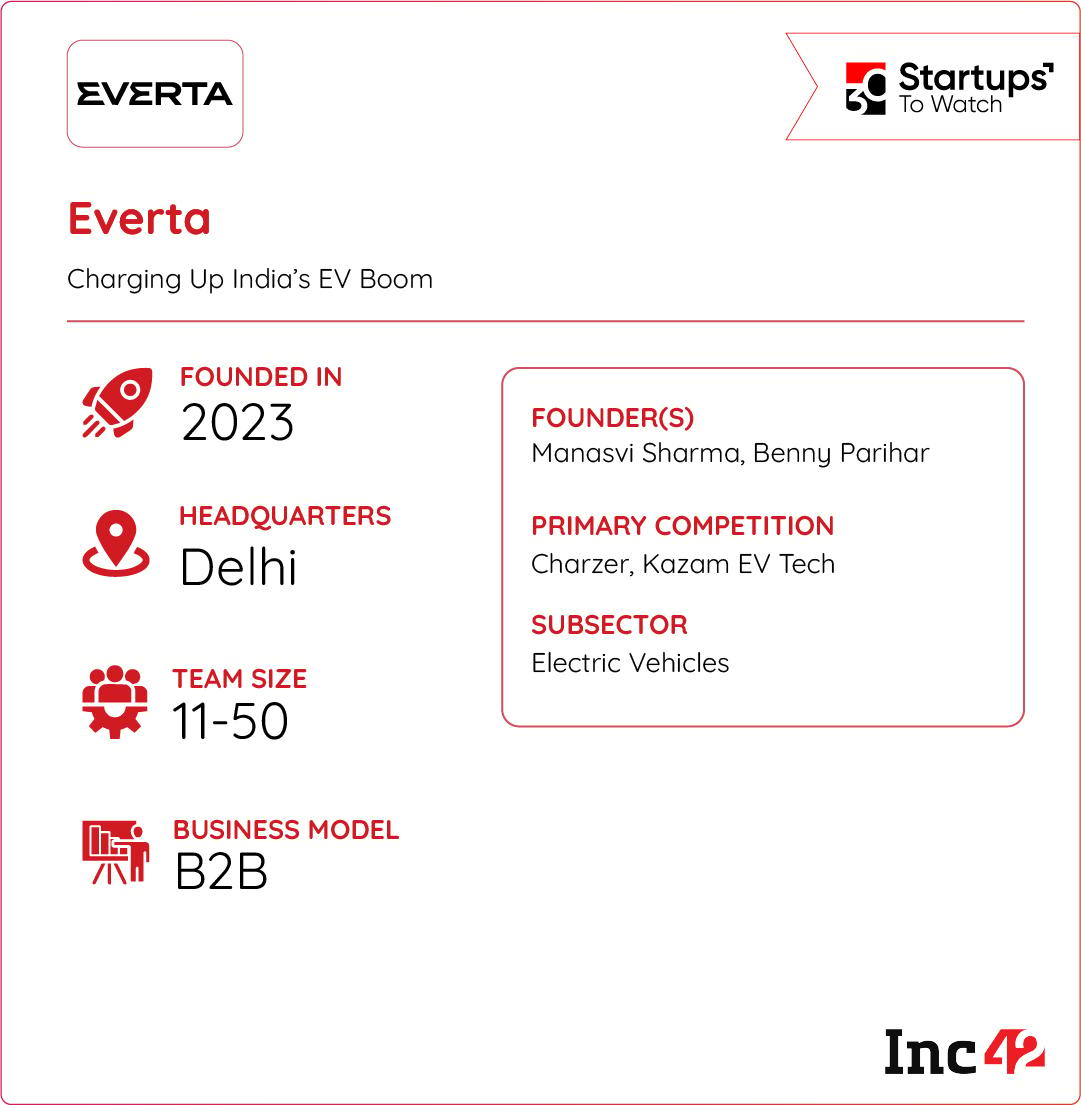
India may be headed towards electrification, but the journey is hindered by a patchy charging network.
Range anxiety, long charging times and unreliable infrastructure continue to challenge consumers and fleet operators alike. Everta is tackling this gap head-on with robust, India-specific EV charging solutions.
Founded by Manasvi Sharma and Benny Parihar, the startup provides both DC fast chargers (60kW–320kW) and AC chargers (3.3kW–22kW), along with end-to-end installation support and annual maintenance contracts.
What sets Everta apart is its commitment to building weatherproof chargers, tailored to local road and climate conditions. In Q3 2025, the company began DC charger manufacturing at its new Bengaluru facility.
With the Indian EV charging market expected to hit $754 Mn by 2030, Everta is eyeing a 15% share of the DC charging segment. It plans to roll out 3,000 chargers annually by 2027, contributing meaningfully to India’s projected need for 4 Mn public chargers by the decade’s end.
Fire AI | Helps Make Sense Of Your Data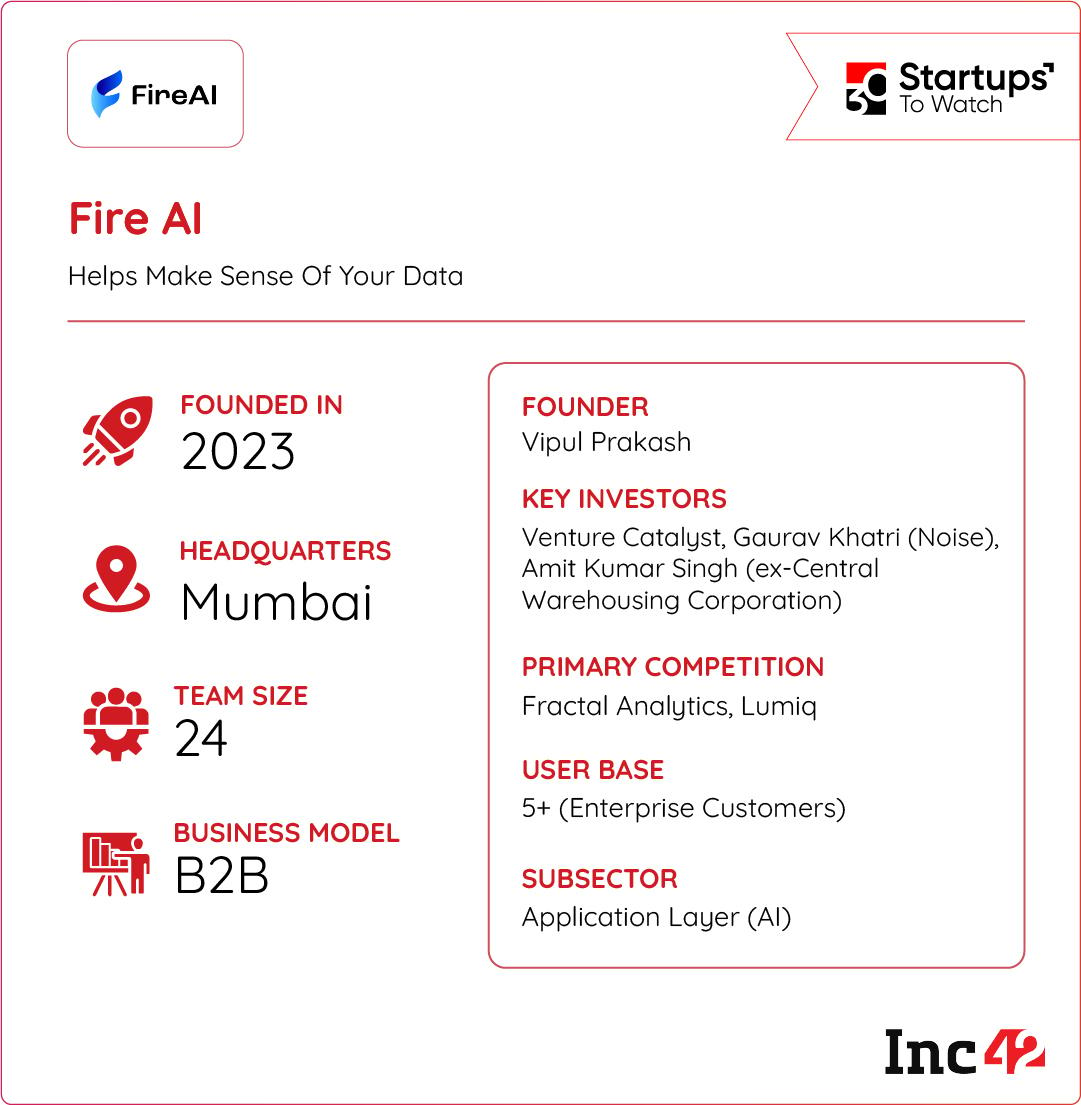
With businesses generating more data than ever, many struggle to make sense of it to effectively leverage it. Although many teams rely on analysts or data specialists for reports, it only slows down decision-making.
Positioned as a modern BI tool for the AI era, Fire AIis aiming to change this with an AI-powered platform that makes data accessible to everyone.
Founded in 2024 by former BharatPe executive Vipul Prakash, Fire AI lets users ask questions about their data in simple language and receive instant, AI-generated insights. Its platform helps teams get real-time answers, generate predictive analytics and receive smart alerts. These empower them to act faster and plan better.
The core idea behind Fire AI is to reduce dependence on data teams by enabling every department to access insights independently.
Fire AI’s platform is built on what it calls a “true AI engine” and includes enterprise-grade security to ensure privacy and compliance.
Flent | End-To-End Proptech Solutions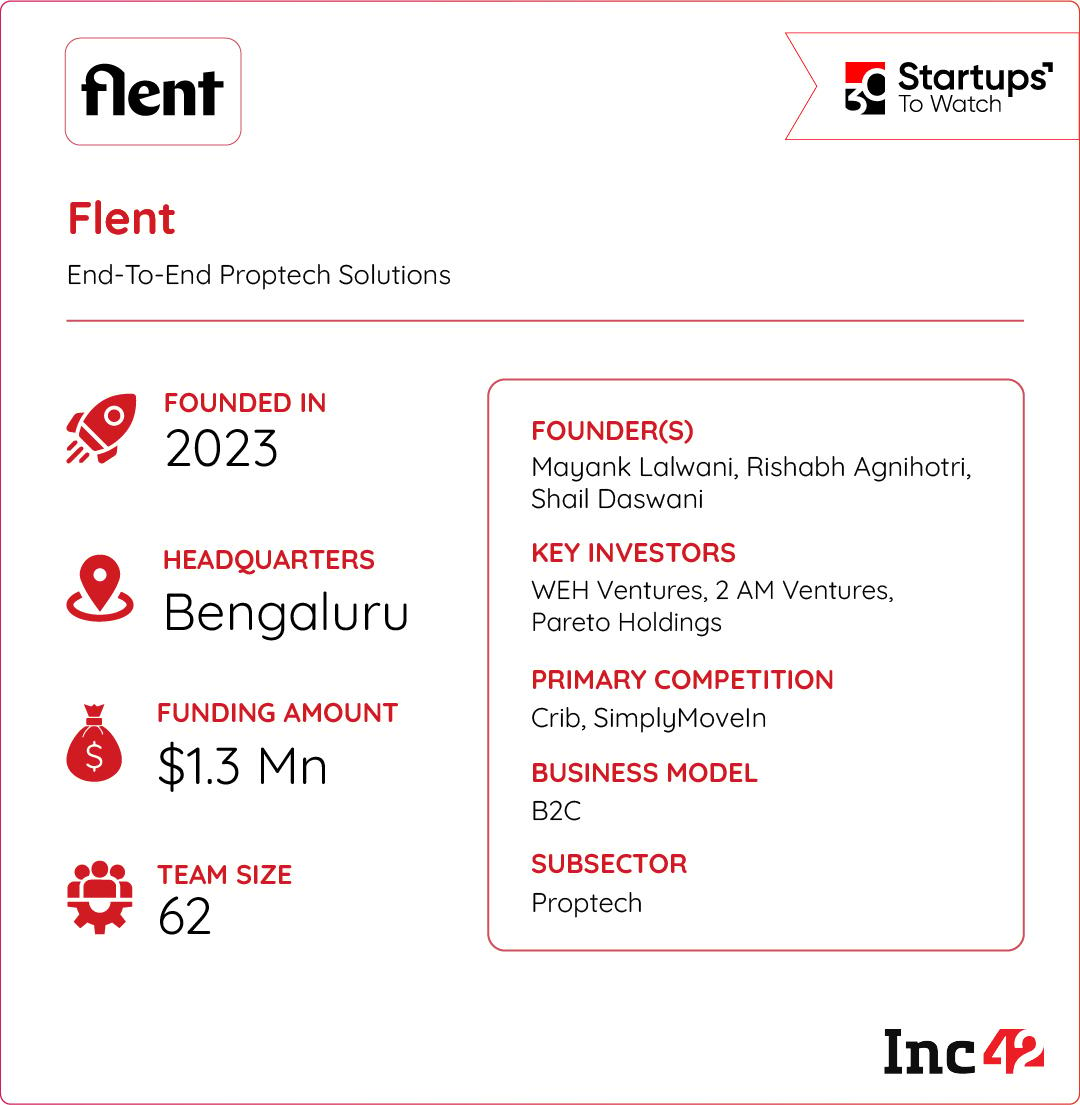
In India’s fast-paced urban centres, finding a rental home can be a daunting task. High brokerage fees, steep deposits and often unfurnished or poorly maintained spaces make the process of finding a decent rental home both expensive and exhausting for urban migrants.
Flent is looking to change this. Founded in 2023 by Mayank Lalwani, Rishabh Agnihotri and Shail Daswani, the startup offers fully furnished, designer rental homes tailored for young working professionals. It takes a full-stack approach, streamlining the rental experience for tenants while also managing the properties for homeowners.
The idea is simple — a rental model that cuts out the usual hassles of brokers, hefty deposits, and the burden of furnishing a new home.
Tenants get ready-to-move-in spaces with flexible terms, while landlords benefit from managed services and higher occupancy.
Flent operates in India’s larger proptech market, expected to surpass the $3.7 Bn mark by 2030. It directly locks horns with Zolo Stays, Settl and Nestaway in the space.
GreenStitch | Helping Fashion Brands Go Greener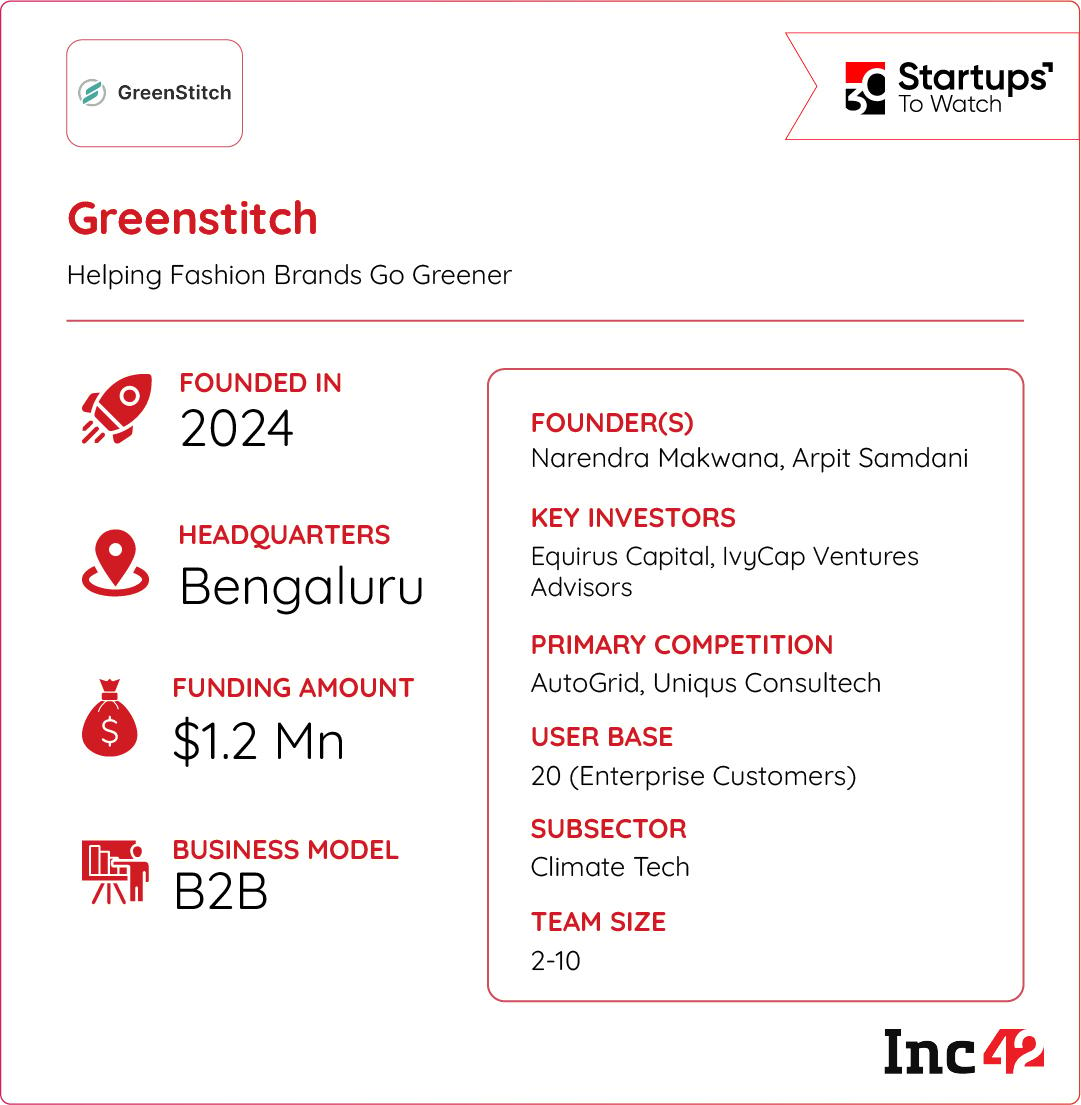
As environmental awareness and stricter regulations reshape consumer expectations and corporate responsibilities, businesses across industries are under pressure to adopt sustainable practices. The fashion and textile industry, in particular, faces mounting scrutiny due to its complex supply chains and significant environmental impact.
Yet, carbon accounting and sustainability reporting remain challenging due to scattered data and a lack of specialised tools.
That’s where GreenStitch steps in. Founded in 2023 by Narendra Makwana and Arpit Samdani, GreenStitch.io provides sustainability software specifically designed for fashion and textile brands.
The platform helps companies measure, track, and reduce their environmental footprint through tools like carbon accounting, life cycle assessments (LCA), and ESG compliance support.
By simplifying how brands monitor their supply chains and assess product impact (from raw material to disposal), GreenStitch empowers them to make informed, greener choices while meeting global standards.
In less than a year, GreenStitch has signed up around 20 customers across six countries. With 58% of its revenue currently coming from India and the rest from global markets, the startup plans to onboard over 100 new enterprises in the coming year.
Hound | AI-Powered Due Diligence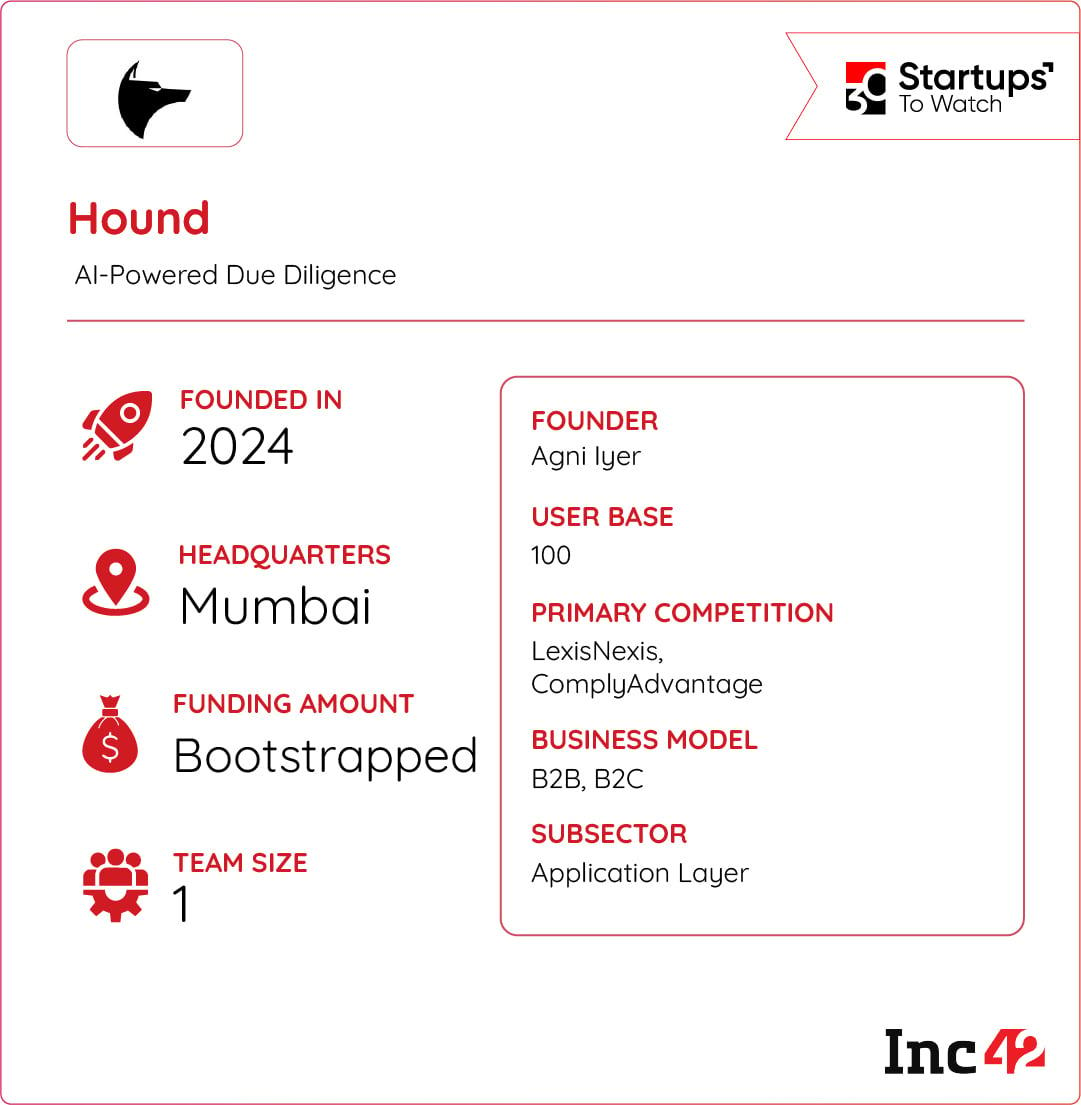
In today’s business world, trust and reliability are the crucial factors when forging partnerships. However, traditional due diligence is not enough. This is because manual checks and basic document reviews are slow, error-prone, and often miss red flags.
Founded in 2024 by the former operations head of Unify, Hound is changing this. It offers an AI-powered assistant for instant due diligence, making risk checks faster, smarter and more reliable.
Hound offers two main products — a global risk assessment tool and an expert-level forensic audit engine.
With the first, users can run instant checks on individuals or companies — scanning global sanctions lists, criminal records, and adverse media to flag potential risks. The system also keeps monitoring for new threats and notifies users in real time.
For deeper insights, users can upload financial documents like annual reports, and Hound’s AI will analyse them to detect red flags such as tax discrepancies or related-party transactions.
Hound has already crossed 100 early signups. In 2025, it aims to secure five enterprise pilots and reach 100 paid users. By 2027, the startup plans to scale to 10,000 subscribers and lock in 10 private enterprise contracts.
Inbound Aerospace | Reusable Spacecraft For Orbital Experiments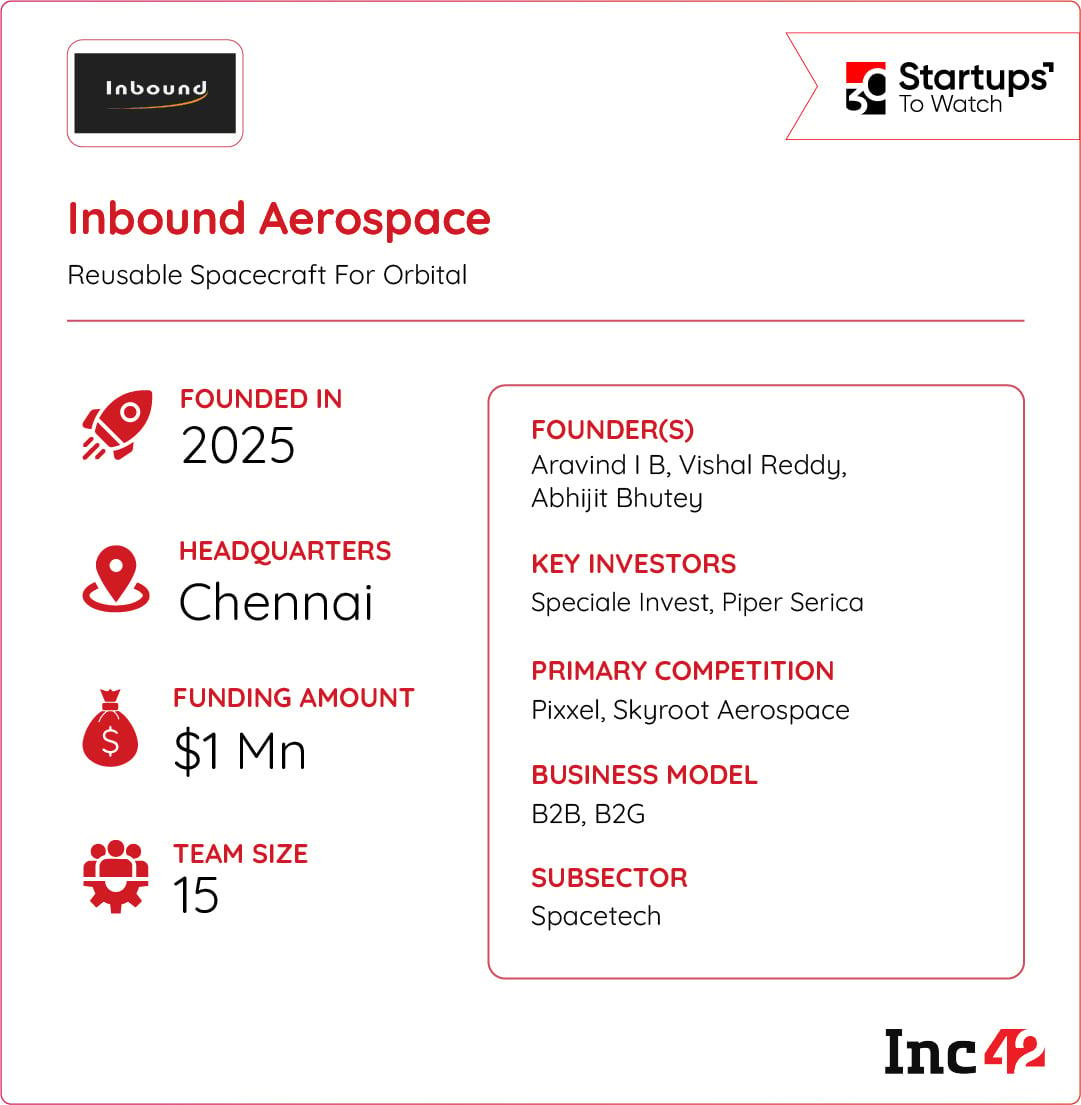
Founded in early 2025 by Aravind I B, Vishal Reddy, and Abhijit Bhutey, Inbound Aerospace is tackling a key challenge in space research, which is the lack of access to long-duration microgravity for experiments and in-space manufacturing.
Inbound Aerospace aims to solve this with its autonomous, reusable spacecraft that provides extended microgravity in orbit.
Designed to work with standard launch vehicles, the spacecraft allows scientific or industrial payloads to operate in microgravity for longer periods. After the mission, it safely re-enters Earth’s atmosphere and lands on a runway.
Inbound partners with experts who build experiment hardware for the ISS. The startup recently test-fired its green-fuel-based 1 Newton thruster.
Presently, it is focussing on team growth and subsystem development.
By 2027, Inbound aims to complete a critical design review and begin building a launch-ready version of its spacecraft. As of now, the startup is eyeing a piece of the pie in India’s growing spacetech ecosystem, which is set to grow to $77 Bn by 2030, as per Inc42 research.
Kuddle | Making Pet Parenting Simpler In Urban India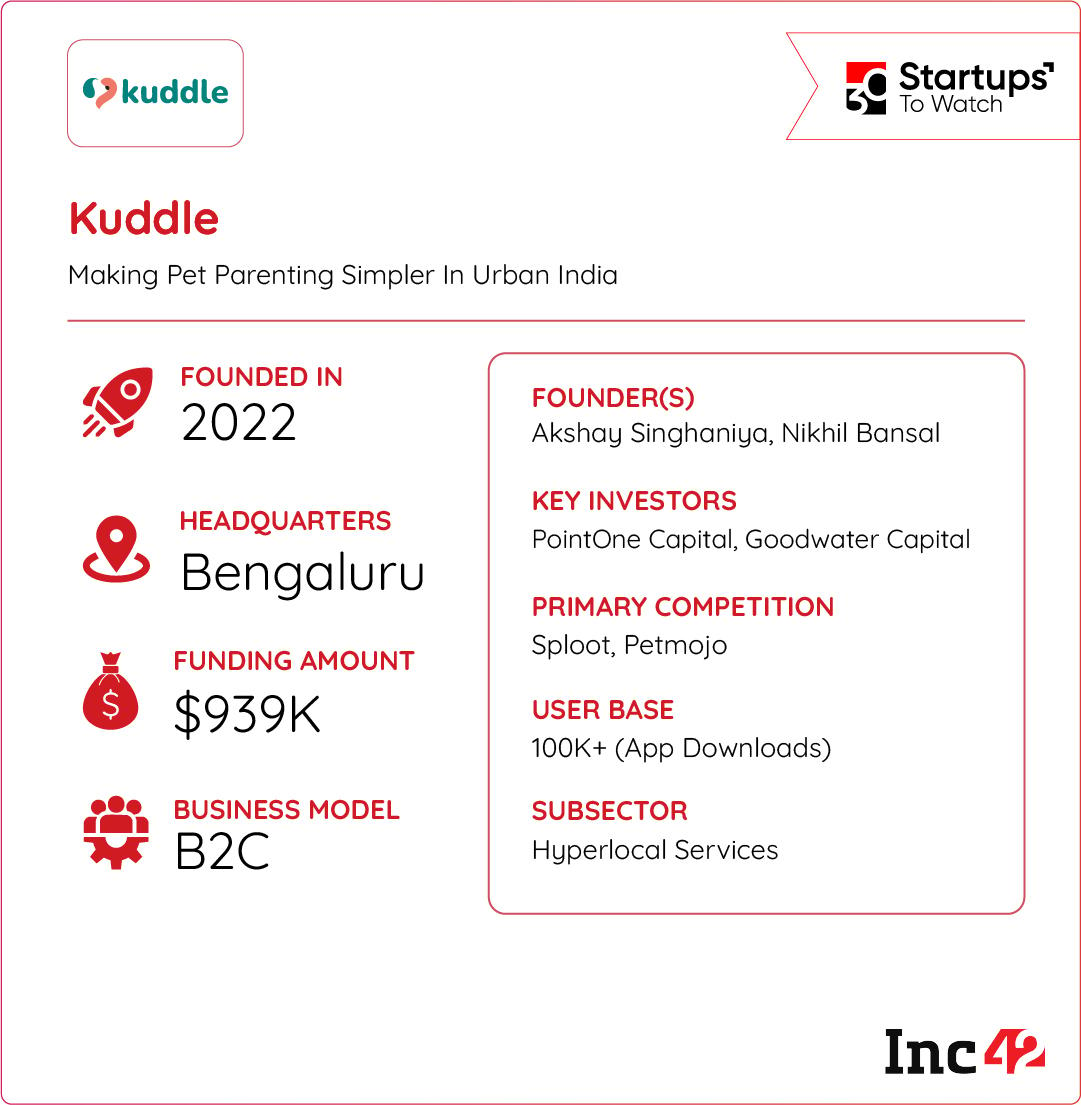
As pet ownership surges across urban India and pets are increasingly treated as family, demand is growing for high-quality pet care services and products that are accessible at home. For time-strapped pet parents, traditional vet visits or pet store runs can be a hassle, creating a clear need for seamless, at-home solutions.
Founded in 2021 by Nikhil Bansal and Akshay Singhaniya, Bengaluru-based Kuddle offers a full-stack platform for pet care at home.
Its services include professional grooming, expert dog training, video-call vet consultations, and access to a nutritionist.
Kuddle also runs an online pet store, offering food, treats, toys, and supplements, making it a one-stop shop for modern pet parenting. This integrated approach aims to bring both convenience and quality to India’s fast-growing pet care market.
As of March 2024, the startup reported $213K in revenue. By May 2025, its team had grown to 20 members, and its community crossed 1 Lakh pet parents.
Lama | Fixing The Missing Link In Online Therapy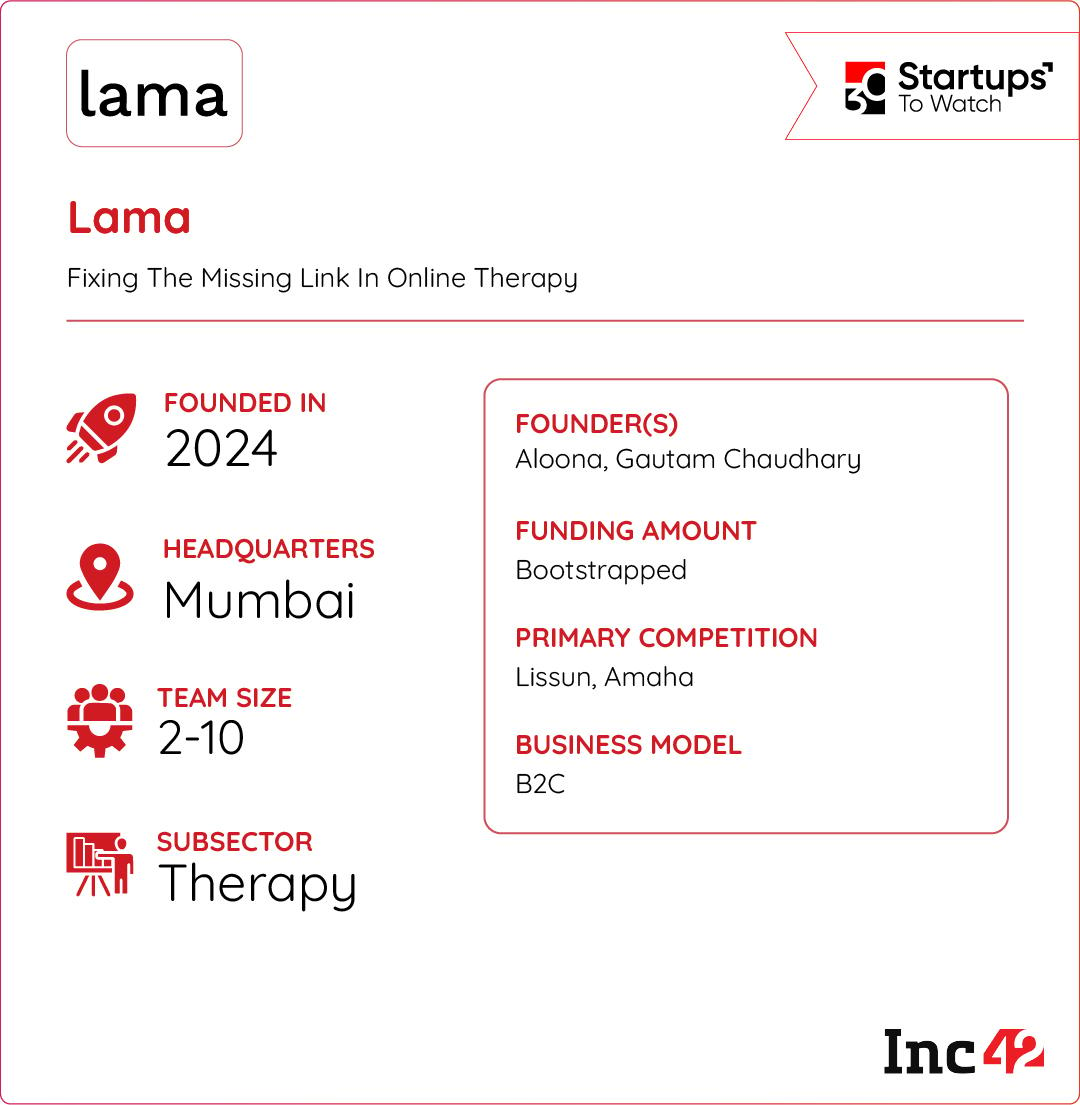
In today’s fast-paced world, mental health issues are on the rise across India. While awareness is growing, access to professional help remains limited due to stigma, geographical gaps and a lack of personalised support.
Many digital therapy platforms still fall short when it comes to building a real human connection between clients and therapists.
Founded in 2024 by former Udaan growth head Aloona and ex-Toppr Gautam Chaudhary, Lama aims to bridge this gap by offering a personalised and culturally sensitive mental health platform. Users are first invited to speak with the founder or a senior Lama official, who helps assess their needs and connects them with a carefully vetted therapist.
Lama focusses on creating a safe, judgment-free space for deep conversations and long-term mental wellness.
It is designed especially for Indians across the globe who seek both cultural familiarity and high-quality psychological support.
Operating in a booming market, expected to grow from $6.89 Bn in 2023 to $62.86 Bn by 2032, Lama is carving a space for itself by putting personal connection and thoughtful care at the heart of online therapy.
Lilypad | Powering India’s EV Boom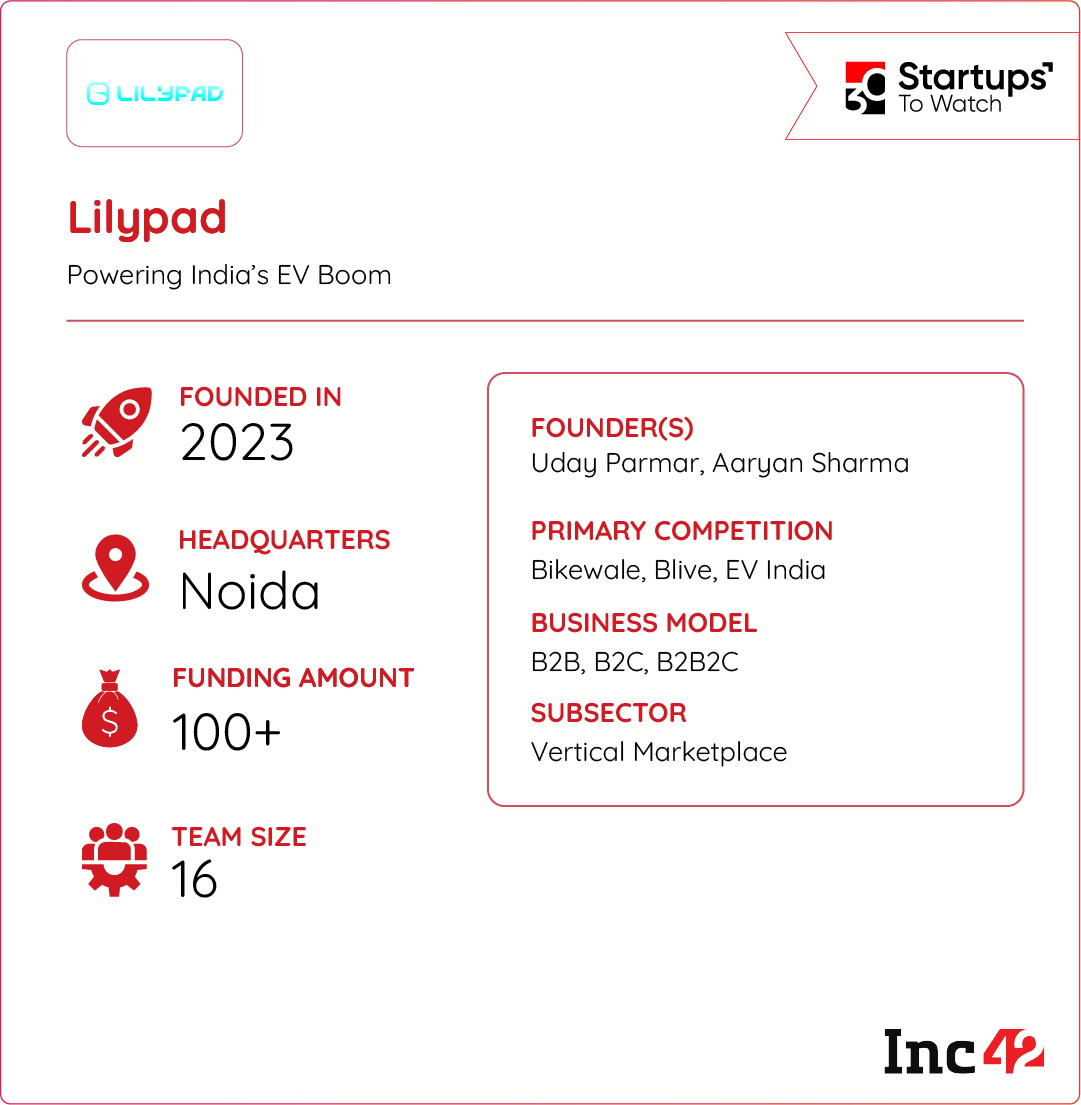
As India’s EV market grows, buyers and sellers still struggle with limited choices and clunky processes. This calls for a digital-first approach to make EV ownership simpler and more accessible.
Lilypad, founded in 2023 by Uday Parmar and Aaryan Sharma, is solving this with its dedicated online marketplace for electric vehicles, with a primary focus on two-wheelers.
The platform enables users to easily browse listings, compare options and complete transactions, addressing the pain points of EV discovery and resale.
Still in its early stages and currently bootstrapped, Lilypad is carving out its niche among emerging players in India’s growing EV two-wheeler market, expected to surge to $10.96 Bn by 2032 from $1.6 Bn in 2024.
Luma Fertility | Reinventing Fertility Clinics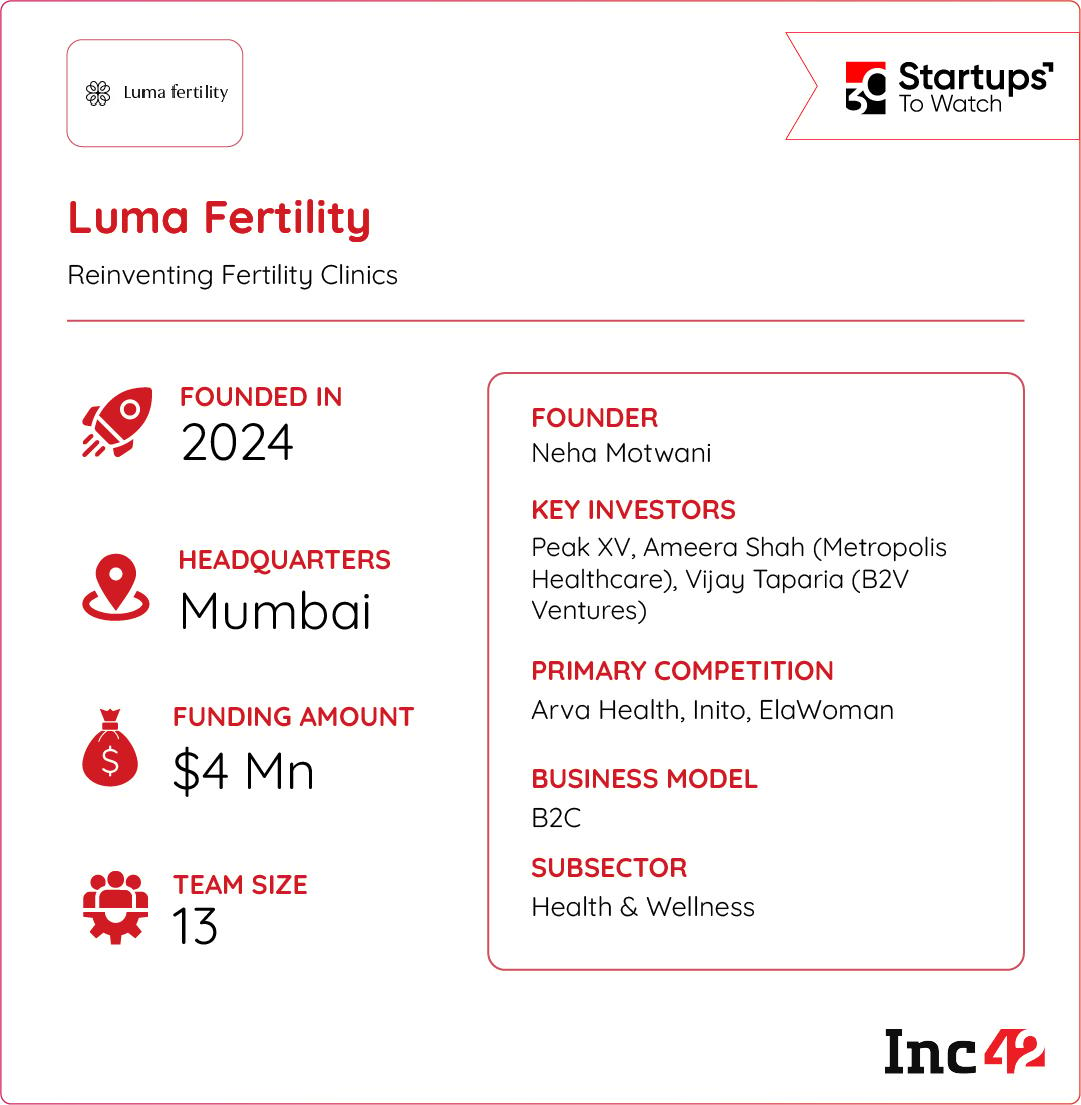
Fertility care in India often feels fragmented, unclear and emotionally draining. This has prompted the need for more c
You may also like

Woman visits ice cream van for first time in 43 years and is floored by cost

'Our Jet2 holiday was ruined because we flew to the wrong Spanish island by mistake'

PM Modi Releases 20th PM Kisan Installment: INR2000 Credited to 9.7 Crore Farmers' Accounts

PM Modi Urges Jan Dhan Account Holders to Complete e-KYC or Risk Account Closure — Know the Deadline and Process

WWE Summerslam 2025: AJ Styles Hints at Potential Final Match







